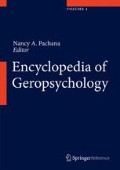Access this chapter
Tax calculation will be finalised at checkout
Purchases are for personal use only
References
Aboderin, I. (2004). Modernisation and ageing theory revisited: Current explanations of recent developing world and historical western shifts in material family support for older people. Ageing and Society, 24, 29–50.
Bengston, V. L., Kim, K.-D., Myers, G. C., & Eun, K.-S. (Eds.). (2000). Aging in East and West: Families, states, and the elderly. New York: Springer.
Bengtson, V. L., & Lowenstein, A. (Eds.). (2003). Global aging and challenges to families. New York: Aldine de Gruyter.
Bengtson, V. L., & Roberts, R. E. L. (1991). Intergenerational solidarity in aging families: An example of formal theory construction. Journal of Marriage and Family, 53(4), 856–870.
Burr, J. A., & Mutchler, J. E. (1999). Race and ethnic variation in norms of filial responsibility among older persons. Journal of Marriage and the Family, 61(3), 674–687.
Caro, F. G. (2014). Family and aging policy. Hoboken: Taylor and Francis.
Chappell, N. L., & Funk, L. (2012). Filial responsibility: Does it matter for care-giving behaviours? Ageing & Society, 32, 1128–1146.
Cheng, S.-T. (2014). Childlessness and subjective well-being in Chinese widowed persons. Journals of Gerontology. Series B, Psychological Sciences and Social Sciences, 69(1), 48–52.
Cheng, S.-T., & Chan, A. C. M. (2006). Filial piety and psychological well-being in well older Chinese. Journal of Gerontology: Psychological Sciences, 61B(5), P262–P269.
Cheng, S.-T., Lam, L. C. W., Kwok, T., Ng, N. S. S., & Fung, A. W. T. (2013). The social networks of Hong Kong Chinese family caregivers of Alzheimer’s disease: Correlates with positive gains and burden. The Gerontologist, 53(6), 998–1008.
Cheng, S.-T., Kwok, T., & Lam, L. C. W. (2014). Dimensionality of burden in Alzheimer caregivers: Confirmatory factor analysis and correlates of the Zarit Burden interview. International Psychogeriatriatrics, 26(9), 1–9.
Cheng, S.-T., Chi, I., Fung, H. H., Li, L. W., & Woo, J. (Eds.). (2015). Successful aging: Asian perspectives. New York: Springer.
Donorfio, L. M., & Sheehan, N. W. (2001). Relationship dynamics between aging mothers and caregiving daughters: Filial expectations and responsibilities. Journal of Adult Development, 8(1), 39–49.
Funk, L. M., Chappell, N. L., & Liu, G. P. (2013). Associations between filial responsibility and caregiver well-Being: Are there differences by cultural group? Research on Aging, 35(1), 78–95.
Ganong, L. H., & Coleman, M. (1999). Changing families, changing responsibilities family obligations following divorce and remarriage. Mahwah: Lawrence Erlbaum Associates.
Gans, D., & Silverstein, M. (2006). Norms of filial responsibility for aging parents across time and generations. Journal of Marriage and Family, 68(4), 961–976.
Hanson, S. L., Sauer, W. J., & Seelbach, W. C. (1983). Racial and cohort variations in final responsibility norms. The Gerontologist, 23(6), 626–631.
Khalaila, R., & Litwin, H. (2011). Does filial piety decrease depression among family caregivers? Aging & Mental Health, 15(6), 679–686.
Lee, G. R., Coward, R. T., & Netzer, J. K. (1994a). Residential differences in filial responsibility expectations among older persons. Rural Sociology, 59(1), 100–109.
Lee, G. R., Netzer, J. K., & Coward, R. T. (1994b). Filial responsibility expectations and patterns of intergenerational assistance. Journal of Marriage and the Family, 56(3), 559–565.
Lee, G. R., Peek, C. W., & Coward, R. T. (1998). Race differences in filial responsibility expectations among older parents. Journal of Marriage and the Family, 60(2), 404–412.
Marcoen, A. (1995). Filial maturity of middle-aged adult children in the context of parent care: Model and measures. Journal of Adult Development, 2(2), 125–136.
Matthews, S. H., & Rosner, T. T. (1988). Shared filial responsibility – The family as the primary caregiver. Journal of Marriage and the Family, 50(1), 185–195.
Rossi, A. S., & Rossi, P. H. (1990). Of human bonding: Parent–child relations across the life course. New York: A. de Gruyter.
Schorr, A. L. (1960). Filial responsibility in the modern American family: An evaluation of current practice of filial responsibility in the United States and the relationship to it of social security programs. Washington, DC: U.S. Department of Health, Education, and Welfare, Social Security Administration, Division of Program Research.
Seelbach, W. C., & Sauer, W. J. (1977). Filial responsibility expectations and morale among aged parents. The Gerontologist, 17(6), 492–499.
Silverstein, M., Chen, X., & Heller, K. (1996). Too much of a good thing? Intergenerational social support and the psychological well-being of older parents. Journal of Marriage and the Family, 58(4), 970–982.
Sung, K. T. (1995). Measures and dimensions of filial piety in Korea. The Gerontologist, 35(2), 240–247.
Whyte, M. K. (2004). Filial obligations in Chinese families: Paradoxes of modernization. In C. Ikels (Ed.), Filial piety: Practice and discourse in contemporary East Asia (pp. 106–127). Stanford: Stanford University Press.
Zhang, Z., Gu, D., & Luo, Y. (2014). Coresidence with elderly parents in contemporary China: The role of filial piety, reciprocity, socioeconomic resources, and parental needs. Journal of Cross-Cultural Gerontology, 29(3), 259–276.
Author information
Authors and Affiliations
Corresponding author
Editor information
Editors and Affiliations
Rights and permissions
Copyright information
© 2017 Springer Science+Business Media Singapore
About this entry
Cite this entry
Wakui, T., Cheng, ST. (2017). Filial Responsibility. In: Pachana, N.A. (eds) Encyclopedia of Geropsychology. Springer, Singapore. https://doi.org/10.1007/978-981-287-082-7_45
Download citation
DOI: https://doi.org/10.1007/978-981-287-082-7_45
Published:
Publisher Name: Springer, Singapore
Print ISBN: 978-981-287-081-0
Online ISBN: 978-981-287-082-7
eBook Packages: Biomedical and Life SciencesReference Module Biomedical and Life Sciences

